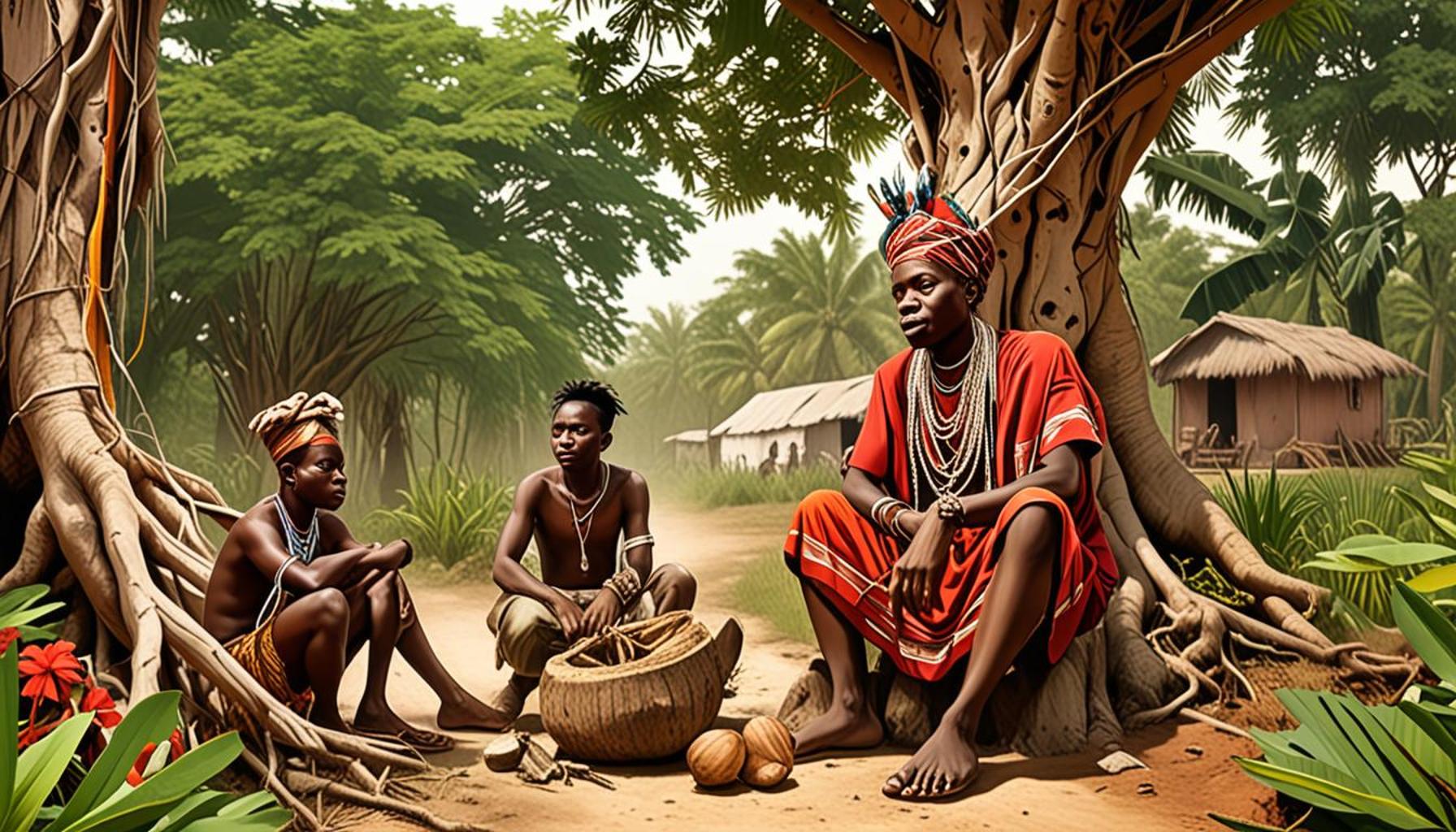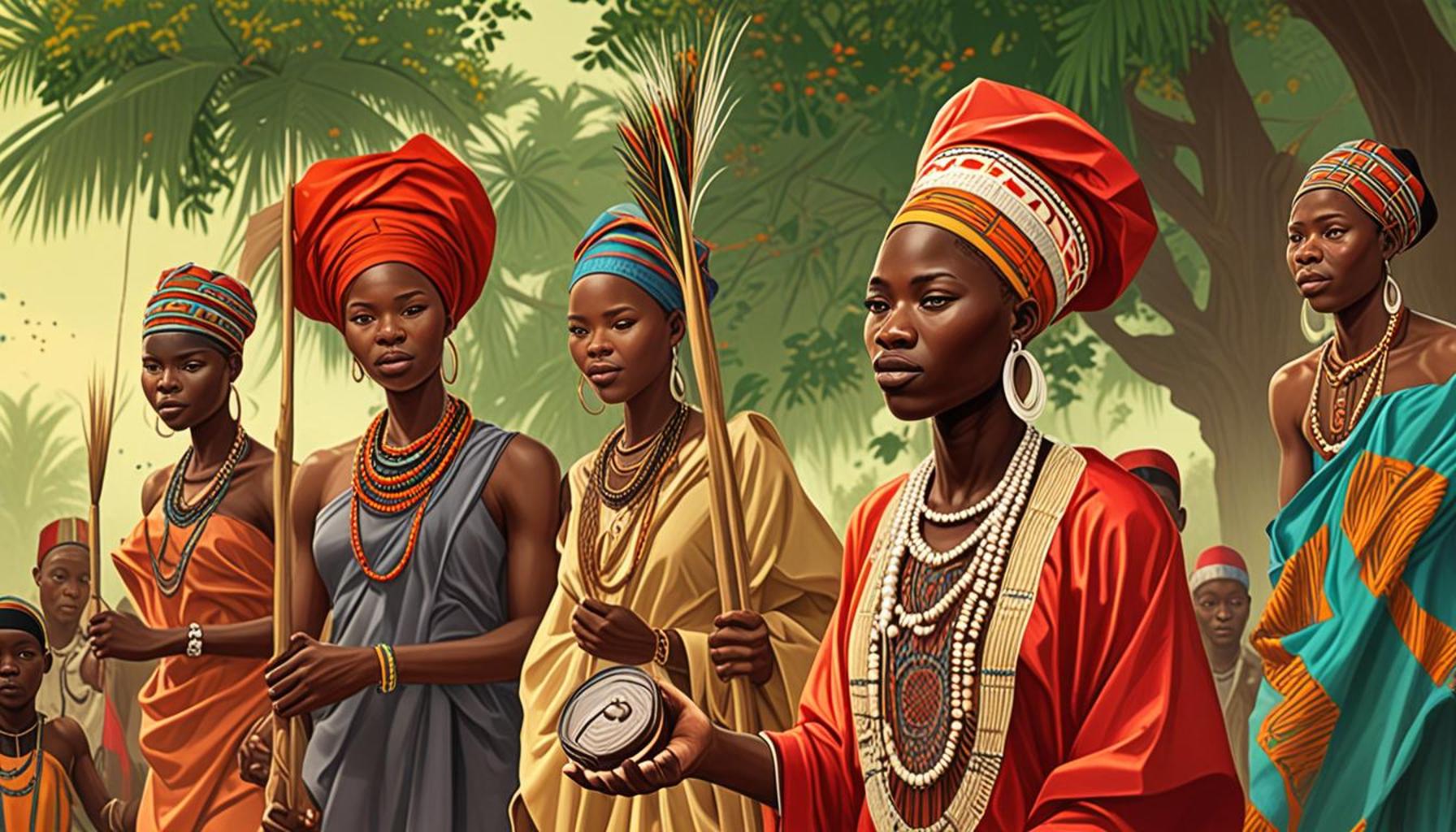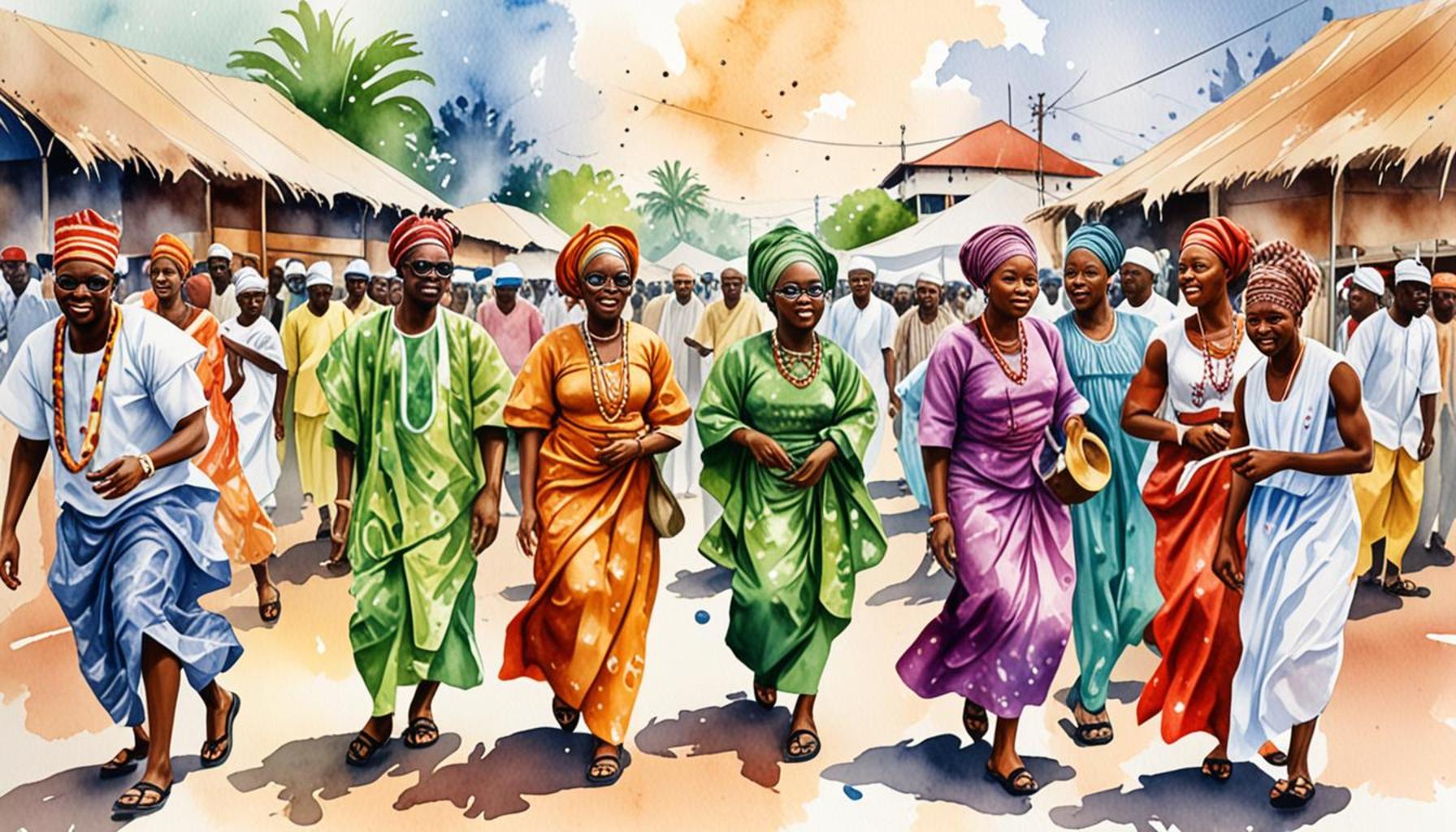Towards the Roots: Itineraries Connecting Visitors to Indigenous Communities of Nigeria

Discovering the Heart of Nigeria’s Indigenous Heritage
As one of Africa’s most culturally rich nations, Nigeria is home to over 250 ethnic groups, each contributing its unique threads to the tapestry of the country’s heritage. Exploring these indigenous communities offers a firsthand glimpse into a world brimming with colorful festivities, ancient rituals, and centuries-old traditions. The Yoruba, for instance, are known for their vibrant festivals such as the Osun-Osogbo Festival, celebrating the river goddess Osun with elaborate ceremonies. Similarly, the Nupe are renowned for their rich storytelling traditions, using narratives to pass down wisdom and history through generations.
Why Connect with Indigenous Communities?
- Cultural Immersion: Engaging with these communities allows visitors to experience authentic practices, art forms, and traditional ceremonies that are often inaccessible in urban centers. This interaction provides opportunities to learn about ancient crafts such as bead-making from the Benin Kingdom or the intricate weaving techniques used by the Igbo.
- Economic Support: Sustainable tourism initiatives not only offer travelers memorable experiences but also contribute to the local economies. By participating in local crafts and purchasing handmade goods directly from artisans, visitors can help uplift communities and ensure the continuation of traditional crafts.
- Environmental Awareness: Indigenous communities possess valuable knowledge surrounding land management and conservation. By learning about the agricultural methods used by the Tiv people, who utilize crop rotation techniques, travelers gain insights into sustainable practices that have been honed over centuries.
Itineraries designed for immersive cultural experiences often promote respectful engagement and aim to preserve ancient traditions in an ever-evolving global landscape. Travelers can partake in traditional cooking classes, such as learning to prepare Jollof rice from local chefs, or attend storytelling sessions that showcase ancestral legacies, often held around a communal fire under starry skies.
Exploring sacred sites, like the Nkwerre clan’s ancient shrines or the historic Aso Rock, holds psychological and spiritual significance. Such journeys illuminate the intricate bond between people and their surroundings, reminding us that Nigeria’s indigenous heritage is not just a relic of the past, but a living, breathing aspect of contemporary life.
As visitors navigate these cultural routes, they step into a larger narrative that honors and celebrates Nigeria’s indigenous roots. This exploration not only poignantly connects individuals with the land and its people but also nurtures a greater appreciation for cultural diversity. Join us in uncovering these paths, and witness the vibrant cultures that continue to thrive in this dynamic nation, where ancient traditions coexist harmoniously with modern influences.
LEARN MORE: This related article may interest you
Unveiling Cultural Pathways
As travelers seek more authentic experiences, connecting with Nigeria’s indigenous communities unveils a wealth of cultural pathways. Each itinerary curated for these communities opens doors to understanding the history, traditions, and everyday lives of people who have inhabited the land for centuries. Visitors no longer simply skim the surface; they dive deep into the heart of Nigeria’s diverse heritage.
One such itinerary may lead you to the Yoruba lands of southwestern Nigeria, where rich spirituality and vibrant arts coexist. Here, you can participate in the Argungu Festival, which celebrates fishing and agricultural practices dating back to the 1930s. Similarly, wandering through the sacred Osun-Osogbo Grove allows visitors to witness rituals that honor the goddess Osun, reaffirming the community’s cultural identity.
The northern landscapes offer pathways to the Hausa-Fulani communities, where visitors can delve into the art of complex weaving and pottery. The intricate designs and colorful textiles worn during traditional ceremonies narrate stories of pride and resilience. By spending time with local artisans who embody these arts, travelers gain insights into the significance of their craft and its role in contemporary life.
Meanwhile, the southeastern region of Nigeria houses the Igbo people, famous for their intense celebrations of life, particularly during traditional weddings and harvest festivals. Here, travelers can participate in community feasts featuring dishes such as oha soup and pepper soup, made from herbs that have been cultivated for generations. This culinary experience transcends mere sustenance; it’s a gateway to learning about the connection between food and cultural heritage.
Key Experiences Not to Miss
- Craftsmanship Workshops: Join artisans in traditional workshops focusing on wood carving, pottery, or bead-making. Each crafted piece carries narratives of heritage that are as rich as the materials used.
- Guided Nature Walks: Local guides offer insightful perspectives on indigenous knowledge of flora and fauna, revealing age-old practices that promote environmental conservation and sustainability.
- Cultural Exchanges: Share stories with elders during storytelling nights, an event that fosters intergenerational dialogue, where wisdom is passed down like treasured heirlooms.
Itineraries that celebrate the Indigenous communities of Nigeria are not merely tours; they are transformations. Visitors emerge with a deeper understanding of the cultural fabric that weaves through modern Nigeria’s identity. These experiences elevate travel from passive observation to active participation, inviting individuals to become part of the story.
As explorers embark on these routes, they reinforce the need for preserving the narratives and practices that have shaped these communities. Not only do such journeys spotlight Nigeria’s rich indigenous cultures, but they also encourage respect and reverence for traditions that endure despite the pressures of globalization. In doing so, visitors return home with newfound perspectives, weaving their reflections into the larger tapestry of human experience.
| Advantage | Details |
|---|---|
| Cultural Preservation | Promotes the heritage and traditions of indigenous communities, ensuring they are valued and transmitted to future generations. |
| Economic Empowerment | Creates job opportunities, stimulating local economies through tourism while enabling sustainable practices in community development. |
The theme “Towards the Roots: Itineraries Connecting Visitors to Indigenous Communities of Nigeria” is not just an exploration of the landscape but a journey into the heart of Nigeria’s rich cultural tapestry. These itineraries serve as windows into the lives of indigenous communities, fostering a greater appreciation for their diverse traditions.Promoting cultural preservation is one of the foundational elements of these itineraries. Visitors engage with local customs, participate in traditional practices, and support efforts to maintain age-old languages and art forms. This not only enriches the travel experience but plays a crucial role in ensuring that these invaluable heritages are not lost with time.Moreover, the advantages extend beyond cultural significance. By focusing on economic empowerment, these itineraries create significant opportunities for employment within indigenous regions. As tourists flock to these communities, local artisans and service providers find new markets for their crafts, leading to a sustainable model that fosters community development. The inflow of tourism dollars enables these communities to thrive, ensuring their traditions continue to flourish while enhancing their economic resilience. As you delve deeper into this journey, the impacts resonate not just for the visitors but profoundly transform the lives of the indigenous peoples at the heart of it all.
LEARN MORE: This related article may interest you
Immersive Encounters with Tradition
The immersive experiences offered through itineraries connecting visitors to Nigeria’s indigenous communities foster not only appreciation but also deep-rooted relationships with the local cultures. Beyond mere observation, travelers gain hands-on experiences that anchor their understanding of indigenous practices while championing sustainable tourism.
A prominent destination is the Benua Valley, where the Idoma people welcome visitors with open arms. Known for their rich artistic legacy, the Idoma’s masquerade performances are mesmerizing, told through vibrant costumes and dynamic dances. Participation in these rituals allows tourists to experience the interplay of spirituality and artistry firsthand. The annual Idoma New Yam Festival serves as a backdrop for these engagements, showcasing traditional farming practices while promoting the community’s culinary heritage, such as the famous yam porridge.
To the east, the Efik people of Cross River State offer visitors a glimpse into their distinctive culture through their renowned Ekpe society, which plays a crucial role in maintaining law and order within their communities. Visitors can partake in the Calabar Carnival, an extravaganza featuring stunning parades and elaborate costumes that honor the region’s cultural diversity. Engaging with local chefs during cooking classes reveals the secret spices and techniques that make dishes like editan soup a staple of Efik gastronomy.
Participative Learning
- Herbal Medicine Workshops: Discover the age-old wisdom of traditional healers who utilize local flora for medicinal purposes. Workshops highlight the relationship between nature and health, educating visitors on sustainable practices in herbal medicine.
- Cultural Festivals: Attend various local festivals throughout the year, such as the Obudu Mountain Festival, which blends celebratory rituals with community gatherings and showcases the beauty of local traditions.
- Canoeing with Fishermen: Get on the water with fishermen from the Ijaw community, learning sustainable fishing methods and understanding the importance of water conservation, deeply intertwined with their way of life.
The impact of these experiences resonates beyond mere personal enjoyment. By engaging in local customs, travelers often contribute positively to the communities, generating income and providing much-needed support for artisans and cultural practitioners. Such exchanges enrich both the visitors and the hosts, sparking dialogues that can lead to mutual understanding and respect.
Moreover, the emphasis on responsible tourism practices ensures that while visitors are immersed in the vibrant tapestry of Nigeria’s indigenous cultures, they respect the delicate balance between tradition and modernity. As communities share their stories and challenges, travelers become advocates for the preservation of these identities threatened by rapid globalization.
Through these enriching journeys, Nigeria reveals its multifaceted personality—a land deeply anchored in history, creativity, and communal ties. Each encounter serves as a thread connecting the past to the present, allowing visitors to weave their narratives into a shared story that celebrates the essence of humanity and the roots of cultural expressions.
ADDITIONAL INSIGHTS: Expand your understanding here
Conclusion
In exploring the vibrant tapestry of Nigeria’s indigenous cultures, the itineraries designed to connect visitors with local communities offer a transformative journey that transcends mere tourism. By fostering immersion in the traditions, art, and lifestyle of Nigeria’s diverse ethnic groups, these experiences provide a platform for deep cultural exchange and understanding. Visitors not only witness the rich heritage of communities like the Idoma and Efik, but actively participate in rituals, festivals, and learning sessions that enliven age-old practices.
This approach to tourism advocates for sustainable practices, urging visitors to become stewards of cultural preservation rather than passive observers. Engaging in activities such as traditional cooking or fishing enhances appreciation while also supporting local artisans and cultural practitioners who rely on tourism for their livelihoods. This builds industries that respect and honor indigenous knowledge systems, ultimately bridging the gap between modernity and tradition.
The impact of such engagements stretches far beyond personal enjoyment; they create a ripple effect that nurtures respect and mutual understanding between diverse cultures. Each traveler’s journey becomes a crucial thread in the narrative of Nigeria, advocating for the protection of cultural identities threatened by globalization. As we embrace these itineraries, we deepen our connection to Nigeria’s past and present, ensuring that the stories of these indigenous communities continue to inspire and educate future generations. Ultimately, through experiences rooted in authenticity, we not only celebrate the essence of humanity but also honor the beautiful complexities of Nigeria’s rich cultural landscape.


